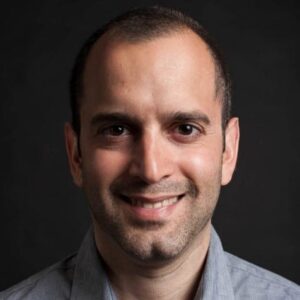
Computational Geneticist and Genetic Epidemiologist,
Columbia University and MyHeritage
Chris Nowak, ASHG: Briefly describe your current position.
Dr. Erlich: I am the Chief Science Officer of MyHeritage and an Assistant Professor of Computer Science at Columbia University (currently on leave of absence). MyHeritage is a large consumer genetics and genealogy company that operates all over the world. We have the largest family tree worldwide and we started about a year ago to offer genome-wide genotyping array based tests. As the CSO of MyHeritage, I am responsible for developing the strategy of the company regarding DNA algorithms and scientific research.
ASHG: Which aspects of your training were crucial to get you where you are now?
Dr. Erlich: Looking back, I feel that the most influential time was serving in the Israeli army (unit 8200). It was quite an amazing experience – they recruit you when you are only 18 years – immediately after high school. Then, for about a year, you are taught “street-fighting”, math, and engineering, which is kind of teaching across disciplines that trains you to solve real-world problem.
You also learn things you can only do in the Army that build your character when facing difficult situations. That is helpful when later, as a trainee scientist, you are basically on your own and expected to work on a research project. The trainee period is full of opportunities and feels like a big incubator for great ideas.
ASHG: Was there a mentor who particularly inspired you in your career?
Dr. Erlich: I am in great debt to Greg Hannon, my PhD advisor. He gave me a vast amount of freedom to pursue my intellectual interests but also challenged me quite a lot. For example, he “suggested” two hours before his talk at a Keystone conference on my thesis topic that I give the talk instead of him! This was my first-ever scientific talk and he worked with me during those two hours on the presentation. I did not even have time to get stressed about it and it went pretty well in the end.
I also try to enable the trainees in my group to be well-rounded persons and pursue their dreams. I am very lucky to work with highly talented people and proud to see where they have ended up.
ASHG: You are involved with both top-level academic science and industry. For genetics trainees, what are the main advantages and disadvantages of getting involved with a company?
Dr. Erlich: Companies have the advantage that knowledge and technologies are much more liquid than in academia. When I ran a lab and wanted to enter into a new domain, I had to either hire a postdoc who was an expert in this domain (which takes usually more than six months), develop it in-house (which takes a lot of time), or form a collaboration, which is not so easy to set up due to the incentive structure (e.g. authorship takes years to materialize).
In the commercial sector, things are largely liquid. If you need a technology, usually there is someone who sells it as a service, product, license, or by a full merger and acquisition. The liquidity in the commercial world means that it is much easier to exchange past accomplishments (i.e. $) with growth, which is why companies today maintain some of the largest genomic database in the world.
The main advantage in academia is the much higher tolerance for long research cycles. Research projects that take two or three years are quite common. It allows you to take much larger risks and also to acquire more thorough knowledge on a specific phenomenon.
ASHG: Would you recommend trainees get experience in the commercial sector early?
Dr. Erlich: That is a hard question! A training position is a time for professional growth and setting the foundation for the next decades of your career – this precious time needs to be invested carefully. Therefore, trainees need to carefully think before jumping into a commercial opportunity.
If the opportunity is merely “come to work with us and see how a large company works”, I would advise against it, because it does not include a substantial place for professional growth. However, if the opportunity includes exposure to a new technology, exciting datasets, or a great mentoring environment, then it is much more appealing.
ASHG: What advice would you give your former trainee-self?
Dr. Erlich: I wish I had taken more time to learn additional software development technologies rather than focusing on rushing to the finish line.
ASHG: Any final words of advice for those interested in these fields?
Dr. Erlich: Don’t fight the imposter syndrome — embrace it! The best projects in my group started as a joke over lunch or a coffee break. Thinking about it, if initially I considered these projects as part of my “real” research agenda, I would be too nervous to pursue these projects. However, I found that by pretending I am not serious about something and just try something out, I can be more creative.
Want more interviews? Join the ASHG Trainee Forum to keep up with new ones
